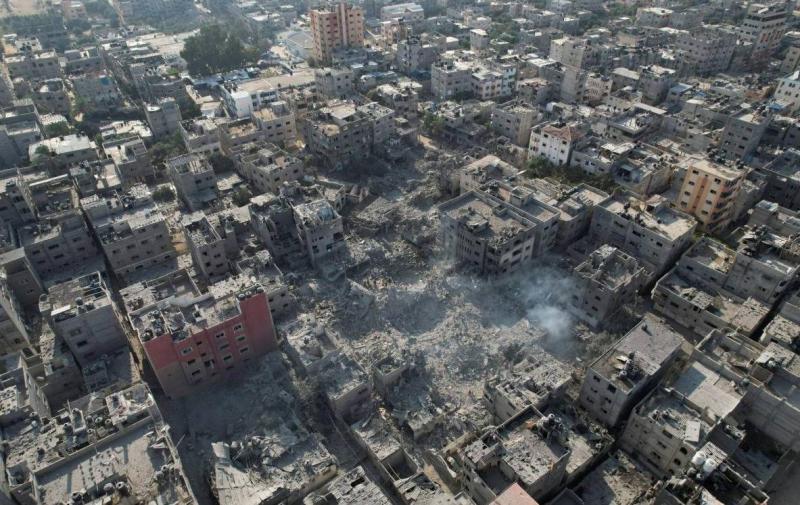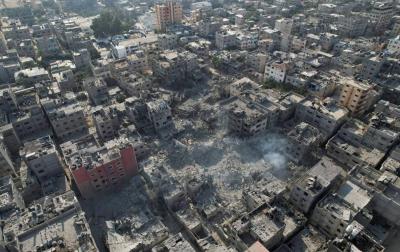Israeli warplanes and tanks struck southern Gaza during the night and on Tuesday, as the United Nations reports that aid distribution to the residents of the Strip, facing increasing hunger, has largely ceased due to the intensity of fighting in the ongoing war between Israel and the Palestinian Islamic resistance movement (Hamas) that has lasted for over two months. In the city of Rafah in southern Gaza, adjacent to Egypt, health officials said that 22 people, including children, were killed in an Israeli airstrike on homes overnight. Civil defense workers continue to search for more victims under the rubble.
Residents noted that the bombing of Rafah, where the Israeli military had ordered residents to go for their safety earlier this month, was among the heaviest in recent days. Abu Khalil, a 40-year-old father of six, told Reuters via phone from Rafah, "At night we can't sleep from the shelling, and in the morning, we go out to search the streets for something for the kids to eat, but there is no food." He added, "I couldn’t find bread, and the prices of rice, salt, and beans have multiplied several times... This is starving... Israel is killing us twice, once with bombs and once with hunger."
Residents in Khan Younis, the main city in southern Gaza, reported that artillery shelling concentrated in the city center. One resident mentioned that tank movements have intensified since Tuesday morning on the street where Yahya Sinwar, the head of Hamas's political bureau in Gaza, lives. Hundreds of civilians have been killed in the Israeli assault on the Strip since the United States vetoed a United Nations Security Council resolution calling for a ceasefire last Friday. Relief agencies report that hunger is worsening among the population, with the United Nations World Food Program stating that half of Gaza's population is facing hunger.
The UN Office for the Coordination of Humanitarian Affairs noted on Tuesday that limited aid distribution is taking place in the Rafah area, but "in the rest of the Gaza Strip, aid distribution has largely halted in recent days due to the intensity of fighting and movement restrictions on major roads." They highlighted that aid flows are also hindered by a shortage of trucks in Gaza, ongoing fuel scarcity, disruptions to communications, and an increasing number of employees unable to reach the Rafah crossing with Egypt due to the intensity of fighting.
Ashraf al-Qudra, spokesperson for Gaza's health ministry, stated that Israeli forces stormed the Kamal Adwan Hospital in northern Gaza on Tuesday, detaining males, including medical staff, in the hospital yard. The Israeli military did not immediately respond to a request for comment on the report. Israel claims that its instructions for individuals to move from place to place are part of measures to protect civilians while it continues its efforts to eliminate Hamas militants, who killed 1,200 people and took 240 hostages in a surprise attack on October 7, according to Israeli statistics. About 100 hostages have been released since then.
Biden states that Netanyahu is in a "difficult position." The Israeli attack in response to Hamas's assault has resulted in the deaths of 18,205 people and injuries to around 50,000, according to the Gaza health ministry. The United Nations General Assembly, comprised of 193 members, is likely to vote today in support of a resolution resembling one blocked by the U.S. in the 15-member Security Council last week. General Assembly decisions are not binding but carry political weight and reflect global sentiments. Some diplomats and observers expect the vote to receive greater support than the General Assembly's call in October for an "immediate, permanent, and sustainable humanitarian truce."
U.S. President Joe Biden, facing criticism for his support of the Israeli assault during a White House Hanukkah celebration on Monday, stated that his commitment to Israel is "rock solid." He added, "If there were no Israel, there would be no Jewish in the world," hinting at his complicated relationship with Israeli Prime Minister Benjamin Netanyahu, whom he said is in a "difficult position." U.S. State Department spokesperson Matthew Miller told reporters that Israel is not exempt from U.S. policy, which mandates that any country receiving American arms must comply with the laws of war.
New Aid Inspection System
United Nations officials state that 1.9 million people, representing 85% of Gaza's population, have become displaced, describing conditions in the southern areas where they are concentrated as hellish. Displaced individuals taking refuge in Rafah are setting up temporary shelters made of wood and blankets outdoors, while others sleep in the streets. To increase the aid reaching Gaza, Israel announced on Monday that it would start inspecting shipments at the Kerem Shalom border crossing without opening the crossing itself. Most trucks heading to Gaza entered through this crossing before the war. Two Egyptian security sources stated that inspections will begin on Tuesday under a new agreement between Israel, Egypt, and the United States. Israel launched a ground attack on southern Gaza following the collapse of a week-long ceasefire on December 1. It has since advanced eastward into the heart of Khan Younis.




